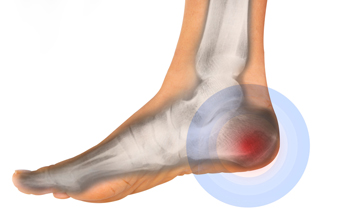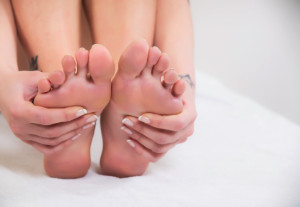Items filtered by date: August 2018
Heel Pain and the Plantar Fasciitis
 If you find you are experiencing heel pain throughout the day, especially in the morning, you may have a foot condition that is referred to as plantar fasciitis. Tenderness in the heel, a tingling sensation, or limping, are among the symptoms of plantar fasciitis. This condition develops as a result of the plantar fascia becoming torn, which may often be due to excessive strain the foot endures during physical activity. When this band of tissue that runs along the bottom of the foot becomes injured, patients will most likely feel intense heel pain. It’s important to have a proper diagnosis performed, and this may be accomplished by undergoing an MRI in addition to a physical examination. There are many treatment options available, and it’s suggested to schedule a consultation with a podiatrist who can choose the best one for you.
If you find you are experiencing heel pain throughout the day, especially in the morning, you may have a foot condition that is referred to as plantar fasciitis. Tenderness in the heel, a tingling sensation, or limping, are among the symptoms of plantar fasciitis. This condition develops as a result of the plantar fascia becoming torn, which may often be due to excessive strain the foot endures during physical activity. When this band of tissue that runs along the bottom of the foot becomes injured, patients will most likely feel intense heel pain. It’s important to have a proper diagnosis performed, and this may be accomplished by undergoing an MRI in addition to a physical examination. There are many treatment options available, and it’s suggested to schedule a consultation with a podiatrist who can choose the best one for you.
Plantar fasciitis can be very painful and inconvenient. If you are experiencing heel pain or symptoms of plantar fasciitis, contact Shaun J. Limon, DPM and Lisa Griffith-Limon, DPM from Limons Foot & Ankle Care. Our doctors can provide the care you need to keep you pain-free and on your feet.
What Is Plantar Fasciitis?
Plantar fasciitis is the inflammation of the thick band of tissue that runs along the bottom of your foot, known as the plantar fascia, and causes mild to severe heel pain.
What Causes Plantar Fasciitis?
- Excessive running
- Non-supportive shoes
- Overpronation
- Repeated stretching and tearing of the plantar fascia
How Can It Be Treated?
- Conservative measures – anti-inflammatories, ice packs, stretching exercises, physical therapy, orthotic devices
- Shockwave therapy – sound waves are sent to the affected area to facilitate healing and are usually used for chronic cases of plantar fasciitis
- Surgery – usually only used as a last resort when all else fails. The plantar fascia can be surgically detached from the heel
While very treatable, plantar fasciitis is definitely not something that should be ignored. Especially in severe cases, speaking to your doctor right away is highly recommended to avoid complications and severe heel pain. Your podiatrist can work with you to provide the appropriate treatment options tailored to your condition.
If you have any questions please feel free to contact our offices located in Bradenton and Lakewood Ranch, FL . We offer the newest diagnostic and treatment technologies for all your foot and ankle needs.
Read more about Plantar FasciitisCauses of Ingrown Toenails
 A condition that is referred to as ingrown toenails commonly develops as a result of the toenails being trimmed incorrectly. This occurs when the corners of the nail grow into the skin, often producing pain and discomfort. There are several symptoms that may lead to the conclusion that an ingrown toenail has begun to form including redness and swelling around the affected area or a liquid discharge that comes from the nail. If the shoes that are worn fit poorly, this condition may begin to develop in addition to specific repeated activity, in which the toe consistently kicks a ball. The patient may find moderate relief by soaking the toe in warm salt water frequently throughout the day, in addition to inserting a small piece of dry cotton under the affected area. It’s strongly advised to consult with a podiatrist for correct treatment remedies that are right for you.
A condition that is referred to as ingrown toenails commonly develops as a result of the toenails being trimmed incorrectly. This occurs when the corners of the nail grow into the skin, often producing pain and discomfort. There are several symptoms that may lead to the conclusion that an ingrown toenail has begun to form including redness and swelling around the affected area or a liquid discharge that comes from the nail. If the shoes that are worn fit poorly, this condition may begin to develop in addition to specific repeated activity, in which the toe consistently kicks a ball. The patient may find moderate relief by soaking the toe in warm salt water frequently throughout the day, in addition to inserting a small piece of dry cotton under the affected area. It’s strongly advised to consult with a podiatrist for correct treatment remedies that are right for you.
Ingrown toenails may initially present themselves as a minor discomfort, but they may progress into an infection in the skin without proper treatment. For more information about ingrown toenails, contact Shaun J. Limon, DPM and Lisa Griffith-Limon, DPM of Limons Foot & Ankle Care. Our doctors can provide the care you need to keep you pain-free and on your feet.
Ingrown Toenails
Ingrown toenails are caused when the corner or side of a toenail grows into the soft flesh surrounding it. They often result in redness, swelling, pain, and in some cases, infection. This condition typically affects the big toe and may recur if it is not treated properly.
Causes
- Improper toenail trimming
- Genetics
- Improper shoe fitting
- Injury from pedicures or nail picking
- Abnormal gait
- Poor hygiene
You are more likely to develop an ingrown toenail if you are obese, have diabetes, arthritis, or have any fungal infection in your nails. Additionally, people who have foot or toe deformities are at a higher risk of developing an ingrown toenail.
Symptoms
Some symptoms of ingrown toenails are redness, swelling, and pain. In rare cases, there may be a yellowish drainage coming from the nail.
Treatment
Ignoring an ingrown toenail can have serious complications. Infections of the nail border can progress to a deeper soft-tissue infection, which can then turn into a bone infection. You should always speak with your podiatrist if you suspect you have an ingrown toenail, especially if you have diabetes or poor circulation.
If you have any questions, please feel free to contact our offices located in Bradenton and Lakewood Ranch, FL . We offer the newest diagnostic and treatment technologies for all your foot care needs.
Read more about Ingrown ToenailsCan High Heels Damage the Feet?
 Many women choose to wear high heels to accent the shape of the foot, despite the pain that may be endured. Additionally, other foot conditions may develop as a result of wearing this type of shoe, including blisters, deformities involving the toes, bunions, and strained calf muscles. Research has shown that when they are worn occasionally, it may give the feet the needed time to rest and heal. It may be beneficial to wear flat shoes or a more comfortable style that may include shoes that are wider, which may give the toes adequate room to move about in. Moderate relief may be found when gentle stretching exercises are performed. This may be accomplished by rolling your foot over a tennis ball, which will stretch the bottom of the foot, in addition to having your heel drop as you stand on a step, which will aid in stretching the heel. If you would like additional information about how high heels affect the feet, please consult with a podiatrist.
Many women choose to wear high heels to accent the shape of the foot, despite the pain that may be endured. Additionally, other foot conditions may develop as a result of wearing this type of shoe, including blisters, deformities involving the toes, bunions, and strained calf muscles. Research has shown that when they are worn occasionally, it may give the feet the needed time to rest and heal. It may be beneficial to wear flat shoes or a more comfortable style that may include shoes that are wider, which may give the toes adequate room to move about in. Moderate relief may be found when gentle stretching exercises are performed. This may be accomplished by rolling your foot over a tennis ball, which will stretch the bottom of the foot, in addition to having your heel drop as you stand on a step, which will aid in stretching the heel. If you would like additional information about how high heels affect the feet, please consult with a podiatrist.
High heels have a history of causing foot and ankle problems. If you have any concerns about your feet or ankles, contact Shaun J. Limon, DPM and Lisa Griffith-Limon, DPM from Limons Foot & Ankle Care. Our doctors can provide the care you need to keep you pain-free and on your feet.
Effects of High Heels on the Feet
High heels are popular shoes among women because of their many styles and societal appeal. Despite this, high heels can still cause many health problems if worn too frequently.
Which Parts of My Body Will Be Affected by High Heels?
- Ankle Joints
- Achilles Tendon – May shorten and stiffen with prolonged wear
- Balls of the Feet
- Knees – Heels cause the knees to bend constantly, creating stress on them
- Back – They decrease the spine’s ability to absorb shock, which may lead to back pain. The vertebrae of the lower back may compress.
What Kinds of Foot Problems Can Develop from Wearing High Heels?
- Corns
- Calluses
- Hammertoe
- Bunions
- Morton’s Neuroma
- Plantar Fasciitis
How Can I Still Wear High Heels and Maintain Foot Health?
If you want to wear high heeled shoes, make sure that you are not wearing them every day, as this will help prevent long term physical problems. Try wearing thicker heels as opposed to stilettos to distribute weight more evenly across the feet. Always make sure you are wearing the proper shoes for the right occasion, such as sneakers for exercising. If you walk to work, try carrying your heels with you and changing into them once you arrive at work. Adding inserts to your heels can help cushion your feet and absorb shock. Full foot inserts or metatarsal pads are available.
If you have any questions please feel free to contact our offices located in Bradenton and Lakewood Ranch, FL . We offer the newest diagnostic and treatment technologies for all your foot and ankle needs.
Read more about Effect of High Heels on the FeetHelpful Tips for Proper Foot Care
 Foot care is considered to be an essential part of one’s overall well-being, so it is crucial that you take precautions to care of your feet. Perhaps the most important tip to follow is to never ignore pain in your feet. As soon as you notice a substantial amount of pain in either of your feet, you should immediately contact your podiatrist. Another tip is to perform daily foot inspections, so you will be able to treat any issues before they progressively become worse. Additionally, it is important to practice proper hygiene and to wash your feet on a daily basis to ensure that you are not exposing yourself to harmful bacteria. The way you trim your toenails has an influence on whether or not you will develop painful ingrown toenails. The best way to trim your nails is to trim them straight across instead of in a rounded shape. For diabetics, it is especially important that you take care of your feet, because these ordinary foot conditions can easily become more serious.
Foot care is considered to be an essential part of one’s overall well-being, so it is crucial that you take precautions to care of your feet. Perhaps the most important tip to follow is to never ignore pain in your feet. As soon as you notice a substantial amount of pain in either of your feet, you should immediately contact your podiatrist. Another tip is to perform daily foot inspections, so you will be able to treat any issues before they progressively become worse. Additionally, it is important to practice proper hygiene and to wash your feet on a daily basis to ensure that you are not exposing yourself to harmful bacteria. The way you trim your toenails has an influence on whether or not you will develop painful ingrown toenails. The best way to trim your nails is to trim them straight across instead of in a rounded shape. For diabetics, it is especially important that you take care of your feet, because these ordinary foot conditions can easily become more serious.
Everyday foot care is very important to prevent infection and other foot ailments. If you need your feet checked, contact Shaun J. Limon, DPM and Lisa Griffith-Limon, DPM from Limons Foot & Ankle Care. Our doctors can provide the care you need to keep you pain-free and on your feet.
Everyday Foot Care
Often, people take care of their bodies, face and hair more so than they do for their feet. But the feet are a very important aspect of our bodies, and one that we should pay more attention to. Without our feet, we would not be able to perform most daily tasks.
It is best to check your feet regularly to make sure there are no new bruises or cuts that you may not have noticed before. For dry feet, moisturizer can easily be a remedy and can be applied as often as necessary to the affected areas. Wearing shoes that fit well can also help you maintain good foot health, as well as making it easier to walk and do daily activities without the stress or pain of ill-fitting shoes, high heels, or even flip flops. Wearing clean socks with closed shoes is important to ensure that sweat and bacteria do not accumulate within the shoe. Clean socks help to prevent Athlete’s foot, fungi problems, bad odors, and can absorb sweat.
If you have any questions please feel free to contact our offices located in Bradenton and Lakewood Ranch, FL . We offer the newest diagnostic and treatment technologies for all your foot and ankle needs.
Read more about Everyday Foot Care
